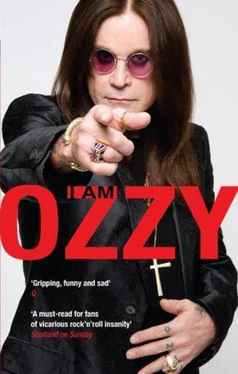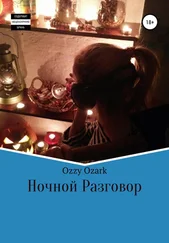The other people in there were the usual chronic boozers and junkies. There was a gay bloke who’d been involved in the Profumo Affair; there was an aristocrat, Lord Henry; and there was a young Asian woman whose name I can’t remember. Rehab wasn’t as advanced in England in those days as it is now. There was still a lot of shame attached to it.
Eventually, Sharon came to visit. I told her how sorry I was, how much I loved her, how much I loved the kids, how much I wanted to keep our family together. But I knew it was useless.
‘Ozzy,’ she said, in this low, quiet voice, ‘I’ve got some important news that I think you’ll want to hear.’
That’s it, I thought. It’s over. She’s found someone else. She wants a divorce. ‘Sharon,’ I said, ‘it’s OK. I underst—’
‘I’m going to drop the charges.’
I couldn’t believe what I’d just heard.
‘What? Why?’
‘I don’t believe you’re capable of attempted murder, Ozzy. It’s not in you. You’re a sweet, gentle man. But when you get drunk, Ozzy Osbourne disappears and someone else takes over. I want that other person to go away, Ozzy. I don’t want to see him again. Ever.’
‘I’m gonna stop,’ I said. ‘I promise, I’m gonna stop.’
Meanwhile, the press was going nuts. They had photographers hiding in the bushes, hanging from the treetops. The story wasn’t over, as far as they were concerned. And even though Sharon dropped the charges, the Crown Prosecution Service said it was determined to put me away on the lesser charge of assault. I still wasn’t allowed to go back to Beel House, either. But then—on Hallowe’en—they dropped the case.
It was finally over.
The press didn’t fucking care, though. One of the newspapers sent a reporter to my mum’s house in Walsall, and then printed some exaggerated bullshit about what a terrible parent she was, and what a shitty upbringing she’d given me. It was horrendous. Then my mum got into a slagging match with them, which just kept the story going. It got to the point where my kids had to stop going to school, because they were being hounded at the gate. So I called up my mum and said, ‘Look, I know it ain’t true what they said, but you can’t win a slagging match with the tabloids. And if you keep making a fuss, they’re going to keep making my kids’ lives hell. Why don’t I go on the BBC this week and put the record straight. Then we can put it all behind us, eh?’
My mum agreed, so I went on the Tommy Vance show on Radio 1 and said my bit—that my parents had been great, that the press were telling lies, the whole lot.
Settled. Over. Done. No more.
The next thing I know, my mum’s demanding a retraction from one of the papers, and the whole thing blows up again. So it drags on for another three months, the kids have to keep staying away from school.
Finally, she called me and said, ‘You’ll be glad to know I got that retraction.’
‘Are you happy now?’ I said, still pissed off with her.
‘Yes, very happy. They’re just working on the settlement.’
‘Settlement?’
‘I asked them for fifty thousand, and they’ve just come back with forty-five thousand.’
‘So it was all about money? I would have given you the fucking money, Mum. I was trying to protect my kids!’
Looking back now, I can’t blame my mum for acting the way she did. She’d grown up poor, so fifty grand was a massive amount of dough. But I still found it very depressing. Was it just all about money? Was that the meaning of life? I mean, friends said to me at the time, ‘It’s all right for you, ’cos you’ve got money,’ and there’s some truth in that. But what killed me was the fact that if one of my kids ever said, ‘Look, Dad, please stop doing this because it’s hurting my family,’ I’d stop doing it immediately. And it’s not like my mum was broke—I gave her an allowance every week. But for some reason she couldn’t understand that the more she bugged the press and complained, the more the press wanted to be on my back. It really hurt my relationship with her, in the end. We were always falling out about one thing or another, and we always made up, but I didn’t go and see her much after she got the retraction. It just seemed that we always ended up talking about money, and I’ve never liked that topic of conversation.
I went on a big mission to clean myself up after rehab. I lost a lot of weight. Then I went to a plastic surgeon to get forty-four of my forty-five chins removed. All he did was cut a hole, stick a vacuum cleaner in there, and suck out all the blubber. It was magic. Mind you, part of the reason I did it was just to get shot up with Demerol, which I thought was the best drug ever.
While I was in there, I had some fat taken off my hips, too. I’ve got no problem with cosmetic surgery, me. If something bothers you, and you can get it fixed, then fix it, that’s what I say. Sharon’s had a shitload of it done—she’ll draw you a map if you ask her. And she looks great. Mind you, it’s like anything in life: you get what you pay for.
I felt a lot better after dropping forty pounds. And I managed to stay off the booze for quite a while, even though I hardly ever went to the AA meetings. I’ve just never felt comfortable in those places. It’s my worst zone. I’ll get up and sing my heart out in front of two hundred thousand people at a rock festival, but when I’ve got to talk about the way I feel to people I’ve never met before, I can’t do it. There’s nothing to hide behind.
Mind you, in LA, those meetings are like rock star conventions. One time, at this clinic in LA, I was sitting in a room with a bunch of other sorry-looking alcoholics, and I looked over and saw Eric Clapton. It was terrible moment, actually, ’cos at the time I was convinced that Clapton hated me. We’d met at an awards show about ten years earlier, and someone had wanted a photograph of me and him and Grace Jones, so we posed for this picture, but I was off my nut on booze and coke, and ended up making all these crazy faces. I got the impression Clapton was either scared of me or just didn’t like me, and for some reason I became convinced he’d personally called up the photographer and had the picture destroyed.
So when I saw him at that meeting, I fucked off as fast as I could out of a back door. Then I saw him there again a few days later, and again I tried to avoid him, but this time Clapton went after me.
‘Ozzy!’ he shouted, as I was about to cross the street to my car.
‘Oh, er, hello, Eric,’ I went.
‘You living over here now?’ he asked.
‘Yeah.’
‘How are you finding it?’
And it went on from there. We had a really nice chat, actually. And then a fortnight later I was browsing through a magazine and there was the picture of me and Eric Clapton and Grace Jones, with me pulling a stupid face and Eric smiling. I’d been imagining the whole thing.
I still hated those AA meetings, though. Eventually I stopped going completely. Whenever I fell off the wagon, I’d just get someone to come over and do one of those home detox things to get me back on the right track again. I was really into all that stuff for a while. Potions, massages, organic herbal fruit baths—any bollocks you can imagine, I did it. Then, one day, this bloke came over and gave me a bottle of colon-cleansing solution.
‘Flush yourself out with this stuff every morning,’ he said, ‘and you’ll feel absolutely amazing, I promise.’
I didn’t get around to using it for a long time—I didn’t fancy the thought of it, to be honest with you—but then finally, one morning, I said to myself, ‘Fuck it, I bought the stuff, I might as well give it a go.’ The solution was made from seed husks, and the instructions said you just had to pour yourself a glass of it and down in it one, before it had a chance to expand in your throat. So that’s what I did. It tasted fucking horrendous—like wet sawdust, but worse. Then I went out with Sharon to look at houses, which was actually a rarity for me, because as far as I’m concerned there’s nothing fucking worse than house-hunting. But on this occasion Sharon really wanted me to see a place that was owned by Roger Whittaker, the easy-listening guy, because it had a recording studio in the basement. I had nothing else going on, so I couldn’t say no.
Читать дальше


